According to statistics, prostatitis occurs in 15% of the male population. This is a dangerous disease that, if left untreated, will lead to the formation of cysts and stones in the prostate gland, erectile dysfunction (impotence) and infertility. You need to know the symptoms of prostatitis to see a urologist promptly and cure the disease without leaving consequences. Inflammation is divided into acute and chronic, each with its own unique characteristics.
Symptoms and signs are common to all types of prostatitis
Despite the fact that prostatitis is acute and chronic, experts have identified a number of common symptoms and signs of the disease in men, inherent in both conditions: first correct andother diseases.
Moderate pain in the episiotomy and scrotum
Pain and pulling in the groin are the first signs of prostatitis in men. The symptom is constant anxiety. Pain increased and decreased. A person cannot accurately pinpoint the location of the discomfort, as pain usually occurs in the lower back, the sacral region.
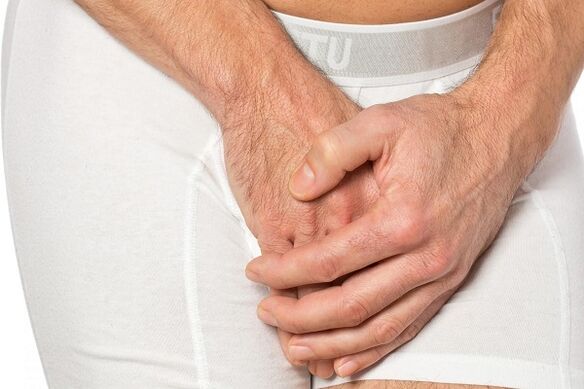
When a symptom appears, a man tries to sit down or lie down, bend down slightly, and pull his knee up close to his stomach.
To treat discomfort, pain relievers of the group of nonsteroidal anti-inflammatory drugs (NSAIDs) are used. It has good pain relief and does not cause serious side effects.
They are not recommended for men with gastritis or peptic ulcers.
Increased urination (hematuria)
With prostatitis, a man starts running to the toilet every 1, 5-2 hours. If you drink a few liters of beer or too much water in hot temperatures, the condition becomes completely intolerable: cravings occur every 20-30 minutes.
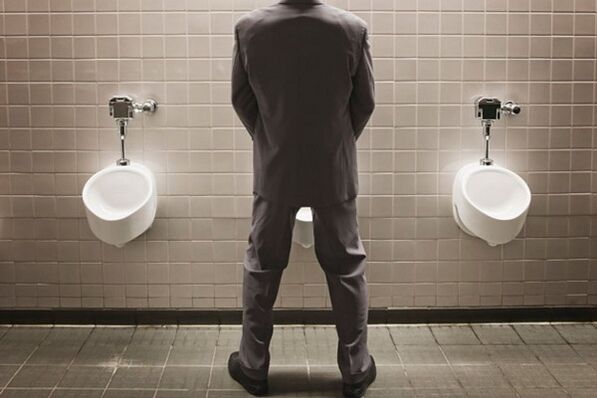
After going to the toilet, I feel sad and do not go away.
With a UTI, there are no pills that will help. The "drink less water" option also won't work in this case. Lust can occur even when there is a small amount of urine in the bladder.
Malaise
Body weakness usually appears from the very beginning of illness. Many people do not take them seriously, thinking that everything is due to overwork.
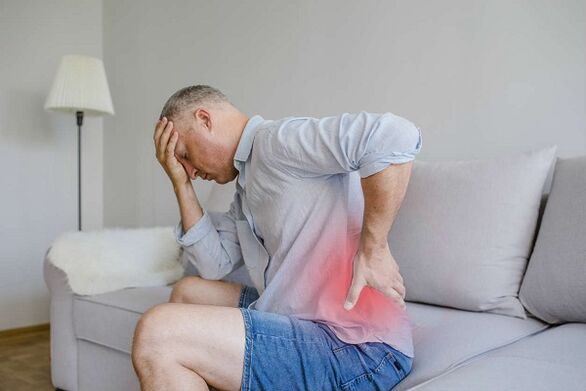
If a man after 40 years of age suddenly experiences severe fatigue, incomprehensible aches and pains in the muscles and joints, decreased interest in work, this may indicate the development of prostatitis. . This symptom alone does not allow a diagnosis of pathology, but when combined with 2-3 other symptoms, it is very possible to develop prostatitis.
To improve his health, a man needs more rest, normalizing his daily routine. A good 7-8 hour sleep is very important, and you should sleep as late as 11pm. The good effect will come from vitamins both in natural form and in supplement form (should be used after consulting a specialist).
The flow of urine is slow
Urinating with a stream that is too weak and short, spitting out in all directions are typical complaints of men when experiencing prostatitis. Seeing such a problem, a person tries to strain and squeeze out a "strong flow", but nothing happens. For prostatitis, it is precisely the characteristic slow flow, not the excretion of urine into drops, which is often observed with prostate adenomas in the middle and late stages of development. .
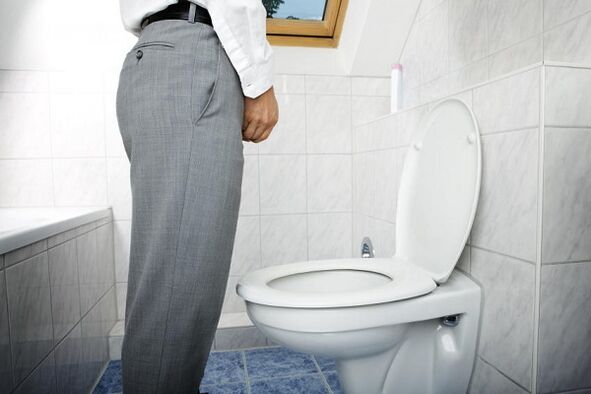
The symptom is mainly related to a swollen or dystrophic change in the tissues of the prostate gland, causing a blockage of the urethra. NSAIDs that reduce puffiness may help alleviate some illnesses during the acute course, but they are ineffective in chronic inflammation. It is possible to eliminate edema at home with the help of prostate massage, but for this a man must have certain skills.
Mucus discharge from the urethra
During the day there appear drops of secretions in the glans penis. Exudate is caused by self-massage of the prostate gland that occurs when walking briskly, playing sports, or running. As a result, part of the inflammatory secretions travels through the urethra and passes out. Often the mucus is cloudy, has an unpleasant odor, sometimes a poor color.
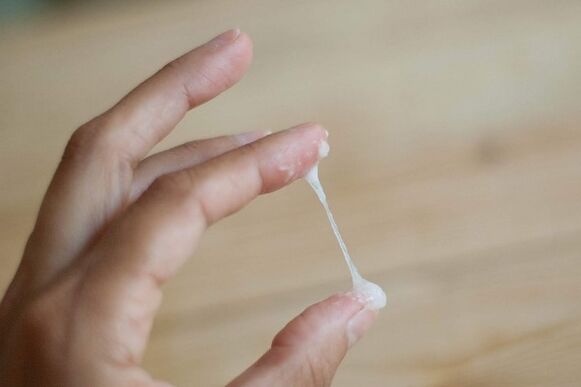
Men who face a symptom need to adhere to strict hygiene. The genitals should be washed at least 2-3 times a day, as secretions build up on the foreskin which is an excellent environment for the reproduction of pathogenic bacteria. The genitals can be washed with an antiseptic solution or chamomile water, helping to kill harmful microorganisms.
Pain when urinating
A symptom of prostatitis is cramping and a burning sensation (burning) in the urethra that occurs when urinating. The discomfort is more pronounced in the morning, as a large amount of inflammatory secretions accumulates in the prostate gland at night. Resi worries a man not only during the action, but also for 15-20 minutes.
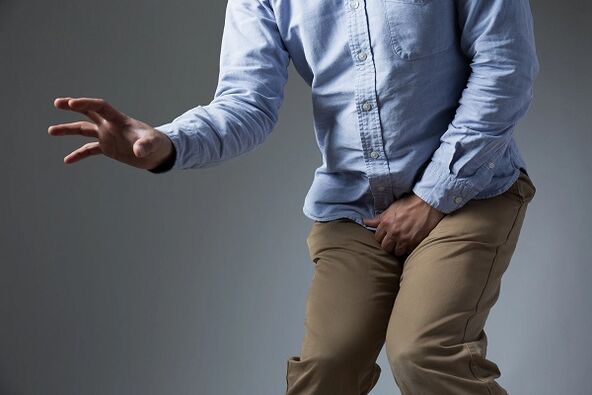
To ease discomfort, you can use herbal medicines. The drug has antibacterial and anti-inflammatory effects, relieves symptoms and prevents inflammatory diseases of the urethra against the background of inflammatory prostate disease.
Required prompt
Men describe this feeling as a sudden and painful urge to urinate. There is a fear of "not reaching", because the feeling is very painful and very strong.
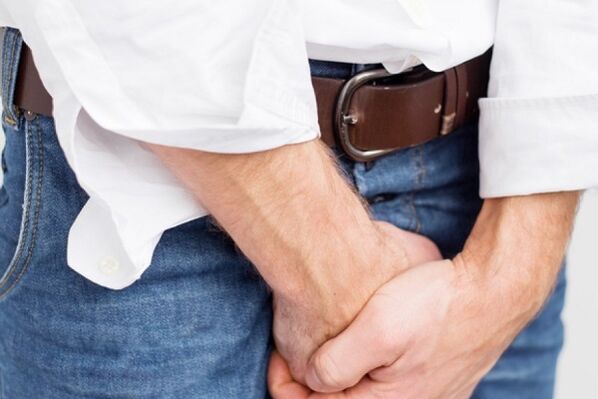
There is often a false craving, when the flow of urine does not occur, and after a few minutes the pain subsides. Sometimes this symptom is accompanied by incontinence, when a few drops of liquid appear in the clothing.
The only advice from doctors in such a situation is to not try to endure the urge. Frequent going to the bathroom makes it uncomfortable, but trying to squeeze your muscles can make the pain worse.
Acute prostatitis: what pain at the same time and the feeling of the disease
Acute prostatitis in men has 9 characteristic symptoms, mainly evident in the prostate inflammation. We will give you details on each.
Severe pain in the groin area
Men complain of severe cramps, spasms, and discomfort in the groin area.
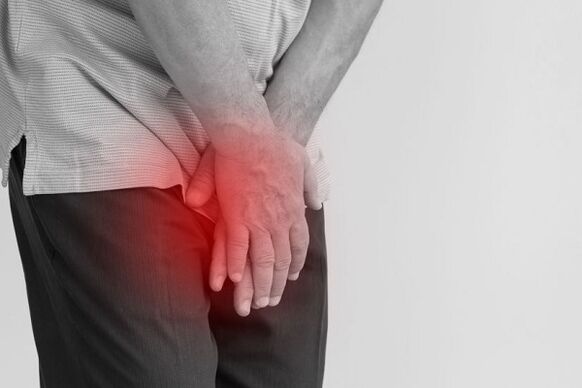
Pain causes constant anxiety, increasing when sitting for a long time in a motionless position, accompanied by nausea. Sometimes the pain is so severe that you cannot walk normally.
This symptom occurs suddenly, possibly before hypothermia or unprotected sex.
Discomfort must be treated. Pain relievers are used for the quick relief of symptoms of prostatitis in men. NSAIDs are the drugs of choice.
Heat
The active inflammatory process in the prostate gland is always accompanied by an increase in temperature. In acute prostatitis, fever reaches a value of 39-39. 5 ° C. Body temperature rises suddenly, sometimes before the onset of pain or other typical symptoms.
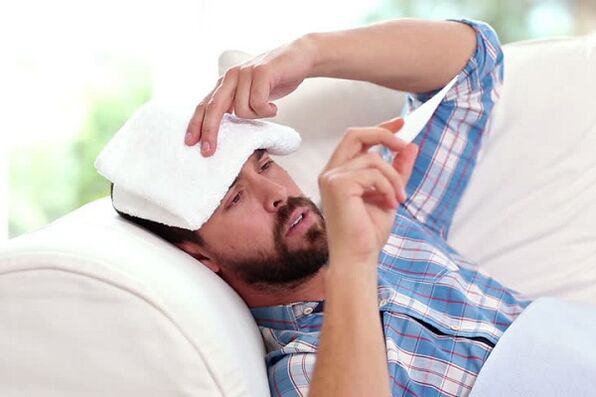
This symptom may be accompanied by episodes of alternating chills and increased sweating.
Temperatures above 38 ° C need to be lowered. Standard antipyretics are sufficient. You should not use acetylsalicylic acid to lower the temperature. It has many proven side effects when used incorrectly, so it's best to use safe products.
Cloudy urine
With inflammatory prostate disease, an inflammatory fluid is secreted from the gland, which appears during urination.
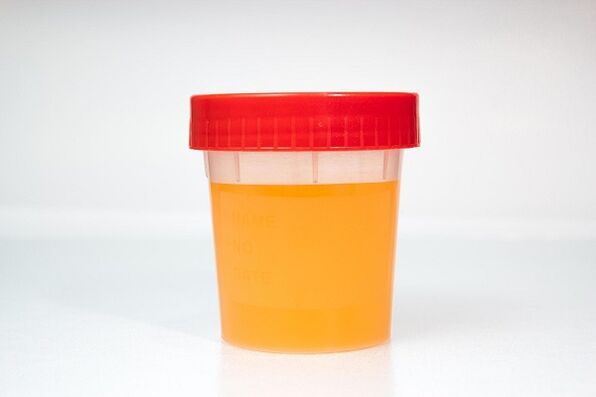
As a result, the urine becomes cloudy, sometimes with mucus or pus visible. Prostatitis is characterized by a change in the end of the urine, when urination begins to become a familiar line. Turbidity is often accompanied by an unpleasant odor.
If such a symptom appears, it is worth using drugs from the unsafe group. Here, not more suitable herbal remedies, but drugs with an antibacterial effect, which are more effective in this particular case.
Pus discharge from the urethra
A few drops of pus from the mouth of the urethra are typical of bacterial prostatitis.
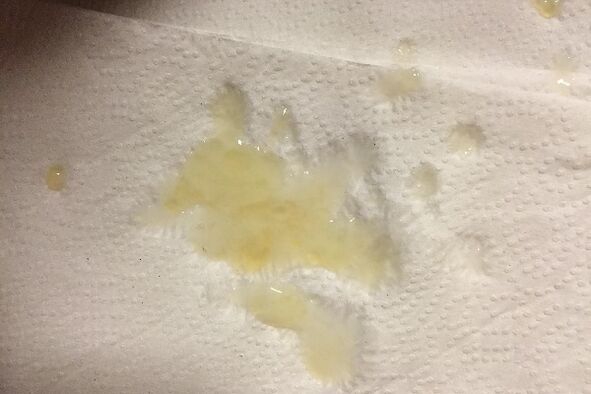
This can occur during the day, as well as at the end of each urination. If prostate disease is caused by trichomoniasis, gonorrhea or other sexually transmitted infections, a lot of pus that smells bad, bubbling may occur.
Symptomatic treatment is performed with uroseptics medications. Men should be hygienic and regularly wash the groin area with a solution of chamomile juice or an antiseptic to prevent irritation and itching of the skin of the penis.
At the same time, it is important to initiate antibiotic treatment as soon as possible to prevent complications that at first glance are harmless discharge.
Urine retention
When the prostate is swollen, unable to urinate, because the lumen of the urethra is initially completely blocked. The man feels like going to the toilet, has a flare-up sensation in the suprapubic region.
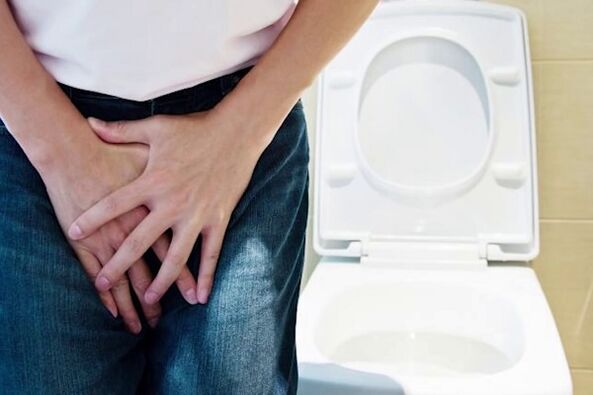
When you try to urinate, the pain gets worse, but to no avail.
Herbal preparations, such as sabal extracts, help fight urinary retention. They facilitate bladder emptying and reduce discomfort during bowel movements.
Headache
Symptoms of acute prostatitis include intoxication. The inflammatory process in the prostate gland is accompanied by the production of specific biochemical markers that affect the state of the entire organ.
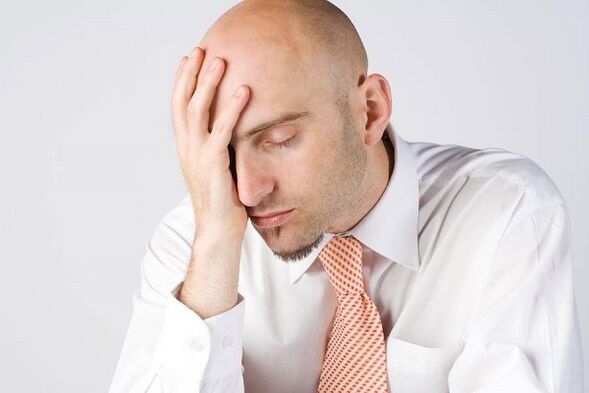
The illness is often accompanied by a high fever, accompanied by a headache of a pressing or spasmodic nature.
For pain relief, pain relievers from the NSAID group are suitable. If the discomfort is mild, medication can be dispensed.
Painful bowel movements
When the intestines empty, there is a strong pressure on the inflamed gland, so the man feels a throbbing pain. Sometimes the pain becomes so severe that the person must try to control the pain so that it doesn't feel uncomfortable.
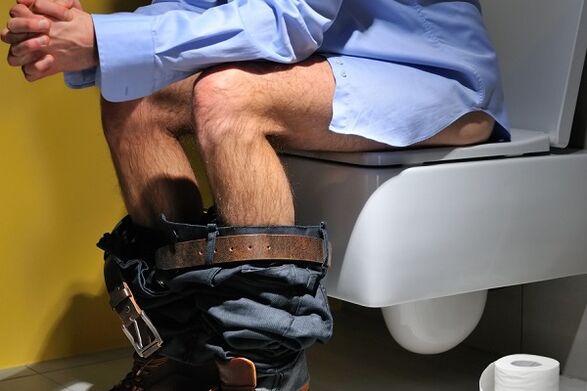
Sometimes, with prostatitis, a burning phenomenon is observed - a painful feeling of "unsuccessful" to defecate.
Discomfort cannot be resolved at home. The pain will only go away after the acute inflammatory process has subsided. Don't restrain the need to have a bowel movement, as constipation can occur, which will aggravate the situation.
Hurt all of the body
An unpleasant symptom of prostatitis is caused by joint compression (supplying nerve endings) to the pelvic organs, so the pain spreads to neighboring parts of the body.
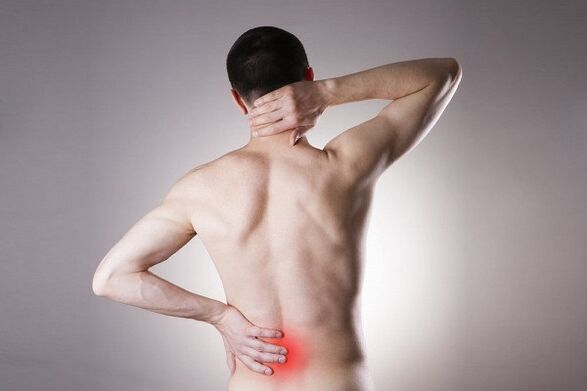
The pain may be dull and aching or sharp. In addition, it is characterized by sharp pain in the lumbar region, which occurs during straining, defecation, and urination.
To eliminate symptoms, pain relievers from the NSAID section are suitable. You should not take a warm bath or warm the lumbar region to alleviate discomfort, as this can intensify the acute inflammatory process and create pus, speeding its growth.
Body aches
This symptom develops as one of the components of intoxication syndrome in prostatitis. The man complained of discomfort in the joints and muscles: they seemed to be twisted, stretched and squeezed at the same time.
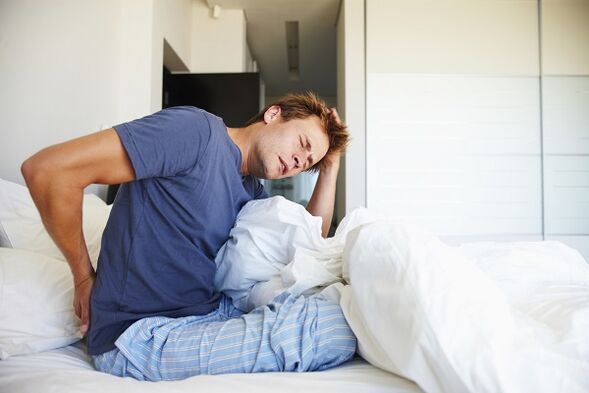
The discomfort is similar to having a cold or the flu.
There are no medications or folk remedies to get rid of discomfort. This symptom mainly occurs against the background of the fever, so after lowering the temperature (in any convenient way), the aches and pains in the body disappear and the state of health improves.
Diagnosis of chronic prostatitis at home with signs and symptoms
Chronic prostatitis is distinguished by a number of signs that can be diagnosed at home, even before going to a urologist.
Pain during ejaculation
Unpleasant sensations bother a man when he reaches orgasm: pulling pain begins in the scrotum and perineum, is infused to the penis. Discomfort reaches maximum intensity during ejaculation, when a person may experience spastic pain.
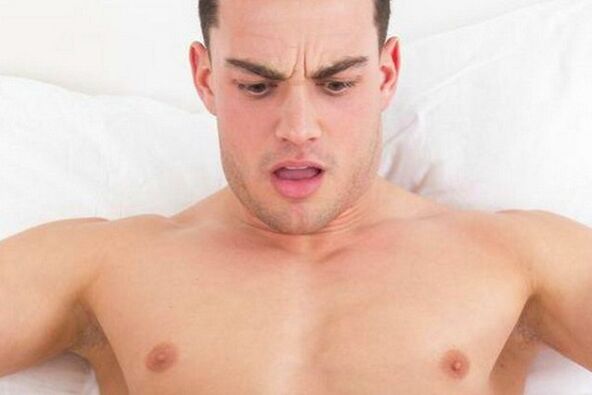
The condition repeats with each intercourse, but the intensity of the painful sensation varies.
To alleviate discomfort, urologists recommend a man to have sex regularly (at least 2 times a week). This helps to eliminate blockages in the prostate gland. After ejaculation, a bath in warm water is helpful for relieving lingering pain.
Regularly go to the bathroom at night
Symptoms of chronic prostatitis include nocturia - unusual frequent urination at night. The patient must wake up 2-3 times or more to go to the toilet.
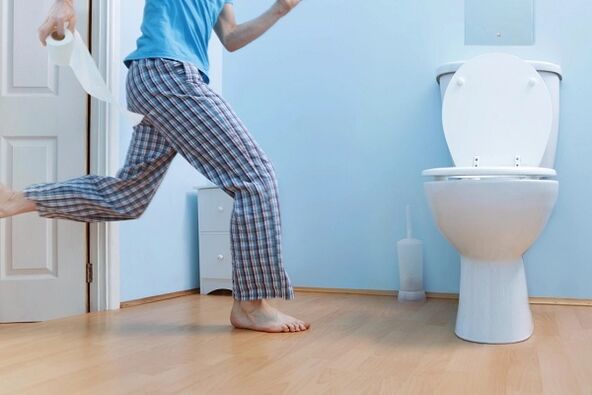
When urinating is quite painful, urine comes out with a feeling of discomfort in the perineum and lower abdomen. This symptom can occur regardless of the amount of fluids you drink at night.
There is no symptomatic treatment. To reduce the frequency of nights awake, you need to limit drinking water and drinks at night, and try to completely empty your bladder before going to bed.
Constipation
The prostate gland increases in size and presses the rectum, so the act of defecation is difficult. Men complained of persistent constipation that lasted 3-4 days or more. When you try to push, pain occurs in the perineum, sacrum. Symptoms bother a person for weeks or even months.
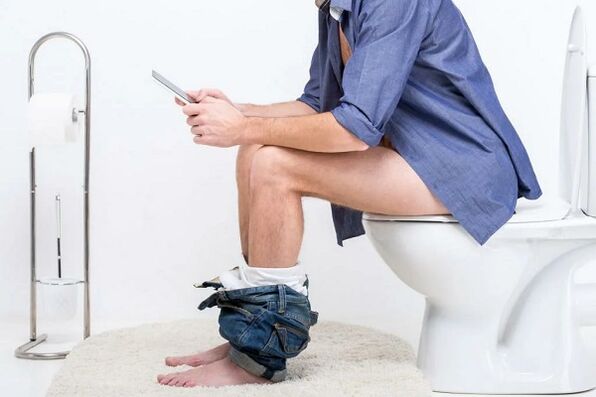
To improve stool condition, doctors recommend eating plenty of vegetables and fruits, whole grains. These foods are rich in fiber, which helps to increase stool volume and help soften stools. Dried prunes, fresh plums, kefir and other fermented dairy products have a natural laxative effect. For prolonged constipation, you can use laxatives or suppositories.
The temperature is below the threshold
An increase in the thermometer index to 37-37, 5 ° C occurs with exacerbation of chronic prostatitis. In this case, headache, irritability, body aches and other typical symptoms of the disease join.
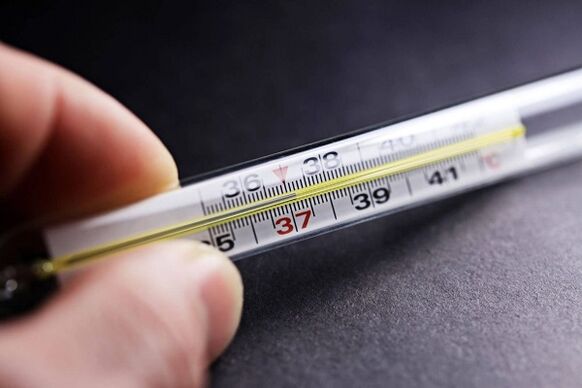
The use of antipyretics is inconsistent with indications of up to 38 degrees on a medical thermometer. Treatment of relapse should be carried out, so that, in fact, a diabetic state arises.
Weak erection
With chronic prostatitis, sexual problems can occur not only in old age but also in young men after 30 years.

The patient complains that during stimulation, the erection is not stiff enough. This causes both psychological and physical discomfort. For fear of "failure", the man avoids sex, which exacerbates the problem.
There are more folk remedies than it is to treat potency problems. Just a few of them: the decoction of thyme and rose hips, tincture, the use of propolis. A man is advised to eat more celery, which has a good effect for an erection and drink ginger tea.
Reduced performance
With chronic prostatitis, a man often feels depressed, tired, irritable, and stressed.

Concentration and memory will inevitably decrease, and performing common tasks becomes more difficult. This symptom also applies to physical work: even with light or exertion of exercise, severe muscle pain and fatigue still occur.
During such time, it is important to take care of yourself, get plenty of rest, and not try to get all the work done to the fullest extent. After treatment for prostatitis (or at least stable remission), the unpleasant symptoms should go away and then it is possible to jump to work.
Inability to become pregnant
With an asymptomatic course of chronic prostatitis, men often see a doctor with complaints that they are unable to conceive.
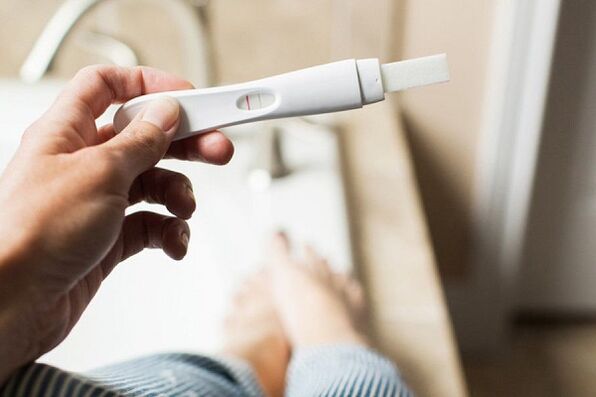
Patients said they did not experience pain and urinated many times, even during sex, everything was normal. This option for the development of the pathology is considered unfavorable, since it means that a man has been in a severe form of the disease.
The production of surviving and active sperm is a serious process regulated by the sexual glands and brain. No folk formulas and symptomatic treatments will help in this case, it's important to research and resolve the problem at the medical level.
Comment: men's comments on the forum
- "I had signs of prostatitis more than a year ago. I felt a little tugging in the groin and episiotomy at first, then the pain grew stronger. I noticed that I woke up 2-3 times. at night to go to the toilet I don't take it too seriously. I think I was frozen somewhere or sitting in a draft. Then the problems during sex started: no erectionstabilization, decreased sensitivity, no vivid feelings during orgasm At work, a colleague recommended bee podmore. I drank for several months (in the form of tincture, bought from a breederlocal bee), the condition improved, the pain disappeared ".
- "I have pain in my scrotum, episiotomy and lower abdomen being pulled. Sometimes a few drops of pus come out of the urethra. I read reviews on the Internet where men describe the same symptoms. each other, went to see a doctor and they were diagnosed with prostatitis I knew that the disease was so serious I decided not to delay my treatment The hospital did a series of tests and ultrasound tests, prescribing medicineProstatitis was cured, but intestinal problems began to occur, possibly with antibiotics, 2 months later I had to buy probiotics, kefir, yogurt. to get rid of bloating ".
- "For a long time, I thought I had some digestive problems. I didn't even know about prostatitis - I didn't know that my lower abdomen hurt and the stools were disturbed. I even started to visit the toilet in a small way, but at first I didn't notice this sign. It was good that I decided to see a urologist. is a chronic prostatitis. I have been treated for a long time, taking different medicines, putting candles. To be honest, I don't even remember the name, somehow it flew out of the way. my head. Now I feel good. "
- "I know first-hand what prostatitis is. It all started suddenly for me: there was intense pain in the scrotum and hypotenic region, the true urge to urinate every 30 minutes. "For a few days, I was very distressed and went to the urologist. They did a urine test and an ultrasound of the prostate gland, took a stain and the doctor wanted to see what was in the rectum with my finger, but I refused, in general . . . It turned out that "acute prostatitis" had developed. The doctor prescribed an antibiotic. After 2 weeks I completely recovered, now no more relapses, I hope not to get it anymore, so scared, because they say prostatitis is incurable. "
detect
With any form of prostatitis, simply using symptomatic therapy is ineffective. NSAIDs or pain relievers will temporarily relieve pain and fever, and diabetes medications will help reduce microbial inflammation. But at the same time, the pathological process in the prostate gland continues to develop, becoming a chronic form. As a result, negative changes (sclerosis), erectile dysfunction and an increased risk of prostate cancer appear.
In order not to bring the disease to sad consequences, it is necessary to completely treat prostatitis. The treatment regimen is prescribed by a doctor (urologist, less often - the specialist in urology), taking into account the characteristics of the disease and the test results.



























